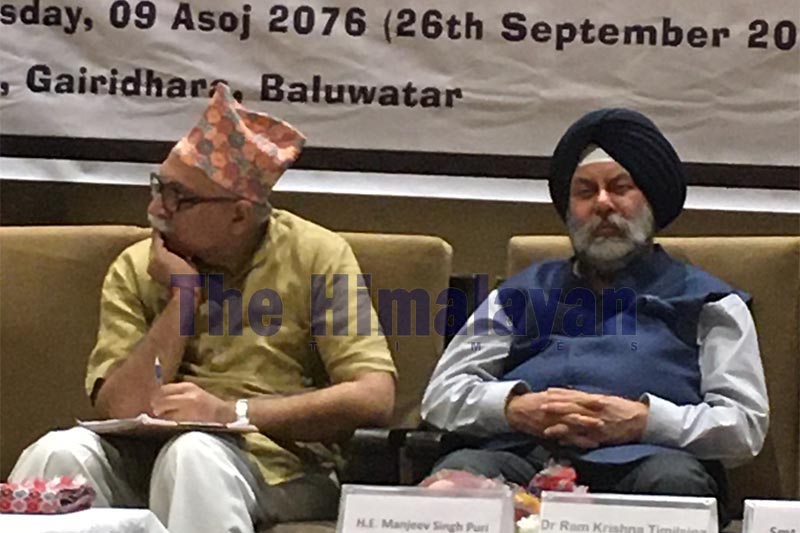‘Scrapping of Article 370 India’s internal matter’
Kathmandu, September 26
Akhil Bharatiya Prachar Pramukh of India’s Rastriya Swamsewak Sangh Arun Kumar today said the recent scrapping of Article 370 from the Indian constitution was India’s internal matter and the move would pave the way for overall development of Jammu and Kashmir.
Addressing an interaction organised by Neeti Anusandhan Pratisthan Nepal and National Law College, Nepal, here today on ‘Article 370 of the Constitution of India: Perception and Reality,’ Kumar said many people had believed the myth about Jammu and Kashmir province.
He said Article 370, which was a temporary provision, proved to be an obstacle for the residents of J&K as provincial laws made by invoking this article placed restrictions on the residents of the province and residents of other provinces of India in J& K.
He said refugees in the province and Gorkha communities were among the residents who had been living for decades but were not granted rights by the provincial laws and their problems would now be redressed.
Kumar said that corruption had flourished in the province as the rulers of the state wrongly used the Article and 10 per cent federal grants was not used for the welfare of the residents of the state. Residents of the state will now have equal rights and opportunities to prosper on par with the citizens of other provinces of India, he said.
Kumar said residents of J&K were happy with the scrapping of Article 370 and if any country was unhappy with it, then it was Pakistan, which had been exporting terrorists and weapons to the state to foment terrorism in J&K.
He said it was because of Article 370 that none of the progressive laws that were implemented across India could be implemented in J&K.
“After the signing of Simla agreement in 1972, the United Nations or any third party did not have jurisdiction over the Kashmir issue, he said and added, “UN secretary generals Ghali and Annan had said that if two consenting states concluded a bilateral agreement by virtue of which peace and normalcy were restored and the agreement was ratified by the respective parliaments, the role of Security Council would come to an end.”
Kumar said when India first approached the United Nations Security Council, it did so to oppose Pakistan’s aggression in India’s Jammu and Kashmir. He said talk of plebiscite was irrelevant now.
He said the then Maharaja of Jammu and Kashmir had signed the accession documents along with other rulers of princely states and if Pakistan challenged that instrument it would mean that it was challenging the legal base for its own creation. “Accession of J& K was full and final,” he argued.
He said in the last 30 years that terrorism plagued J&K, Pakistan had sent 25,000 terrorists and 70,000 pieces of weapons to the state.
Kumar said that all the UN resolutions called the issue of Jammu and Kashmir India’s internal matter and hence all the countries of the world should support India’s actions.
India’s Ambassador to Nepal Manjeev Singh Puri said that the Indian government took the decision to scrap Article 370 as that was the only best option to deal with terrorism and to ensure overall development of the province and its residents. He said UN resolutions also stipulated that J& K was integral part of India. Pakistan has changed the administration of Pakistan occupied Kashmir in violation of international law.
Puri said the decision to scrap Article 370 was made by the Parliament of India after thoroughly debating the issue and thus the decision had the seal of approval of the Indian people.
Kumar and Puri said that the government’s decision would be scrutinised by the Judiciary as it happened in the past with all major decisions.
Executive Chairman of National Law College Ram Krishna Timilsina said Article 370 was inserted in the Indian constitution at the insistence of former Prime Minister Jawahar Lal Nehru after Ambedkar, who was first tasked to draft Article 370 refused the task saying it would be wrong from the rule of law standpoint. He said the Indian Parliament was free to scrap Article 370 as it was not a basic structure of the Indian constitution.
“I think Nepal should support the Indian government’s decision to scrap Article 370 as Nepal is a member of the UN, SAARC and also a good friend of India,” Timilsina added.






